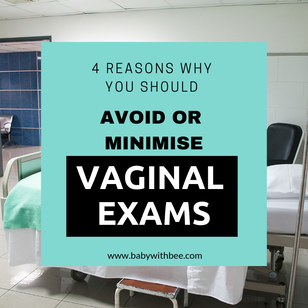|
1/11/2023 10 questions to ask your doctor or midwife to know if they are supportive of natural birthRead Now Have a chat with your doctor or midwife during your antenatal checkups to know if they are supportive of natural birth is a great idea if that's what you are planning. Here are a few questions that you may want to consider asking:
0 Comments
Vaginal exams are done typically every 2-4 hours when you are in labor to check on your progress. You really should avoid or at least minimise them and here’s why.
1. It is uncomfortable or even painful Unless you enjoy strangers sticking their fingers deep into your vagina, it is highly probable that you will find this procedure uncomfortable or painful depending on how gentle the person is. At the very least, it is very disruptive to your labor. 2. It is not a highly useful information Just knowing how many centimetre your cervix has opened at a certain point in time will not help you much. This information cannot be used to predict how long more your labor will be. It only gives you a snapshot of where you are at that moment in time. Mothers can dilate from 5cm to 10cm in 30 mins or they can take 8 hours to dilate 1 cm. Birth is unpredictable. 3. It may cause emotional stress to you Imagine you are admitted to the hospital at 5cm. 2 hours later, you are still at 5cm. How would you feel? Would you freak out, getting hyper stress on the lack of progress and having a million and one worst case scenarios run through your head? Probably! This information which does nothing to predict how long your labor will be can cause you unnecessary stress. 4. It is done for the convenience of others, not you. You will know where you are in labor because you are feeling the contractions and your feelings change as labor progress. You don’t need a vaginal exam to know that. The people around you don’t, that’s why they are checking you constantly. It is like you do not need a electronic device to know that your heart is beating, you can feel it and you know when it is beating faster. Same for contractions. You can feel it go more intense and more frequent so you know your labor is progressing. You will know it is time to birth your baby because it will be similar to the feeling like you want to poo as there will be a lot of pressure on your rectum as baby descends. You don’t need a vaginal exam to tell you that. You will know your baby’s crown is out because it can be seen (maybe not by you but it is certainly visible to others). So mothers, remember to inform your caregiver about your preference to avoid or minimise vaginal exams. If you are a mom-to-be getting ready to give birth soon, make sure you know these three important rights that every birthing mother is entitled to. Moms who are going through labor and giving birth have:
1. The Right to be Respected - As a birthing mom, you deserve to be respected by the medical staff, including both the doctors and the midwives or nurses. This means that you deserve to to be talked to with respect AND you deserve for your birth preferences to be honored. For example, when you assert your preferences, the staff at the hospital do not have a right to talk down to you or shame you by telling you you are being a difficult “patient.” You can choose to spend labor any way you wish to, adopting any position and coping strategies to make you feel comfortable. 2. The Right to Decide who Touches Your Body - This especially applies to who touches and what enters your vagina. You have a right to give (or not give) consent. Let me tell you this story – One day, while I was getting my facial done, I was having small chat with my facial therapist. She told me her birth story as soon as she found out that I taught childbirth classes. It was the most horrifying story! She told me that during labor, because she was in a public teaching hospital, a group of intern doctors came in, took turns to do vaginal exams on her! What more, they were debating about their findings there and then. As vaginal exams are pure estimates, different people, depending on their experiences, will have different estimates. Whilst I understand that these doctors need to gain some practical experiences, every woman has the right to be asked permission, be informed about what they are doing and be aware that she has the right to refuse if she feels uncomfortable. The lady told me she didn’t know she could choose to refuse. I felt very sorry for her at the time. And I feel very sorry for the millions of sisters all around the world who may have been subjected to this without their consent. 3. The Right to Advocate for Your Baby - You and your baby have a right to remain together at all times. There is no need for mother-baby separation or for baby to be sent to the nursery unless there is a medical emergency. (Weighing, bathing and vaccinating the baby immediately after birth are not medical emergencies!). It is important to inform yourself about the benefits and importance of skin-to-skin bonding. Do not let anyone rob you of your precious time with your baby just to follow man made protocols. Nature has a bigger and better plan! The same applies to other baby related practices like delayed cord clamping, delayed bathing, continuous skin to skin, roomin in, immediate access to breastfeeding and more, which are all evidence based practices that benefit both mom and baby. Stand up for your birth rights, mummy! You and your baby deserve it! - Bee Ting Ng, HypnoBirthing Mongan Method Trainer, Author, International Speaker💖 Many people may not realize that a lot of misbehavior in later childhood or even adulthood such as aggression, obesity, depression, lack of empathy and etc. has been shaped by our unpleasant experiences with parents or main care giver during infancy. Baby needs someone to give her an experience of emotions being managed helpfully, before she can learn to do these things for herself and manage her own feelings well. They need to have these experiences consistently, over and over again, during the first and second years of life.
Infant massage is a great way of soothing a baby. In fact, studies have shown that massaging an infant can reduce crying and fussiness, help her sleep more peacefully, and release constipation and colic. When we give our baby a massage, we are actually stimulating her central nervous system. Giving infant regular massages is good for her emotional well-being too. Nurturing touch are among the most powerful forms of communication and bonding between babies and parents. Postnatal depression (PND) has a profound impact on maternal health and wellbeing, and both short-term and long-term implications for mother and infant. Massage may induce oxytocin in both mother and infant and this may promote their bonding relationship. The study indicates that PND mothers are often isolated and vulnerable and yet infant massage is a bridge connecting the mothers to their babies. Infant massage class has both psychological and physiological benefits. Mother and baby can feel calmed and relaxed during massage as released of oxytocin. Furthermore, mother with depressed and anxious feeling may find difficult to communicate with baby. Infant massage may help mother to understand about baby’s cues or behavioural state. Many new parents, upon arriving home with their babies, are in awe of the responsibility of parenthood. Nurturing touch can break through the barrier. - Lee Wei Wei Certified Infant Massage Instructor (IAIM) Certfied HypnoBirthing Childbirth Educator www.babywithbee.com Why go Skin-to-Skin with your newborn Baby?1. Hormone High - When mom and baby are in contact with each other, skin-to-skin and naked, it releases a rush of hormones, especially endorphin (the happy hormone) and oxytocin (the love hormone). These hormones play a role in everything from breastfeeding to postpartum recovery.
2. Bonding with Baby - Holding her naked newborn on her chest, smelling the skin and touching the soft squishy body activates the maternal instinct in the mom. It allows the mom to engage instinctively with the newborn and develop a strong attachment and baby 3. Baby feels safe and secure - Being next to mum is like being in paradise to your sweet child. Your baby can smell you, hear your heartbeat and voice. This helps to relax and calm your baby. In the early moments of birth, as your baby lies skin to skin with you, your baby’s heart rate and temperature stabilises and adjust better to life outside the womb. Babies will also self-initiate breastfeeding provided they are not affected by any drugs used during labor and birth. This may happen shortly after birth or even longer than an hour. I have seen some babies who were born so gently that they continue in their slumber and only start feeding when they are ready. Skin to skin has an added benefit for premature babies. In what is dubbed as Kangaroo Care, prolonged skin-to-skin has been shown to help babies gain weight faster and get out of the NICU earlier than babies who did not have the privilege to be with their mothers. Nature’s incubator, that is the mother’s chest, has been shown to be far more effective than any man-made incubator, it appears. So go mommies (and daddies too), maximize on skin to skin baby snuggle time! - Bee Ting Ng, Certified HypnoBirthing® Childbirth Educator |
Details
AuthorWe are a group of women & mothers who loves all things birth, pregnancy and parenting in Malaysia, Singapore, New Zealand and Australia. Archives
November 2023
Categories |
- Home
- HypnoBirthing
- Class / Service
- Free Workshops
- Become an Educator
- Contact Us
-
Birth stories
- Carol's Gentle Cesarean Section Delivery for her Breech Baby
- Yunix's Calm Happy Hospital Birth
- Yee Von's Natural Drugfree Birth
- Angela Primavera's Exhilarating Fast HypnoBirth
- Cheryl's "I Can Do It" Hypnobirth
- Angela's Empowering Gentle birth
- Cassandra's Painfree Natural Birth
- Lay Khim's Loving Waterbirth
- Jui Chuan's amazing HypnoBirth
- Isabelle's amazing HypnoBirth
- Jin Jin's fast & furious birth
- Wan Ning's calm second birth 催眠分娩
- Lai Yee's En Caul VBAC Birth
- Stella's Breech VBAC Drugfree HypnoBirth
- Grace Ng's easy relaxed birth
- Shu Shee's fast fast birth
- Yoke Sze's gentle drugfree hospital birth
- Sook Yee's natural calm birth
- Daddy Johnny's Testimonial
- Shireen's Painfree Waterbirth
- Pat & Sebastian's HypnoBirth (cord around neck)
- Chloe's Calm Hospital Lotus Birth 醫院的蓮花生產
- Erica's HypnoBirth Second Time Round
- Mei Wei's long-awaited drugfree Hypnobirthing 催眠生产
- Lai Yee Third HypnoBirth
- Jacklyn's easy hospital Birth
- Sze Ling's Just In Time HypnoBirth
- Li Yen's Hospital Lotus Birth
- Davina's Marathon HypnoBirth
- Dawon and SuMin surprise natural birth
- Vivian's Painless, Enjoyable, Happy Birth
- Steven's "So In Awe" Birth Companion Story
- Vvy and Stephen Olympic Style Natural Birth
- Dr Elaine Wonderful Hospital Birth
- Ee Ling's Gentle Waterbirthing
- Natalie's Amazing Natural Birth
- Angela's Epidural-Free HypnoBirth
- Hooi Lin's Healing Natural VBAC
- Siow Mei's HypnoBirthing
- Lee San's Wonderful Hospital Birth
- Vivian Xin Wei's Pregnancy Birth Journey
- Jamy Chua Birth Story
- Huey Tyng One Shoot Natural Birth
- Jean Khoo HypnoBirth
- Elyn Koh Amazing HypnoBirthing
- Joanne First HypnoBirth
- Joanne Second HypnoBirth
- Celine's Amazing VBAC HypnoBirth
- SookYee's International Women's Day birth story
- Eunice Raymond HypnoBirth story
- See Mei HypnoBirthing Malaysia
- MIchelle 的温柔生产故事
- Yvonne's smooth HypnoBirth
- Agnes Easy Smooth HypnoBirth
- Lee Lee 温柔分娩
- 欣惠二胎温柔生产
- Sammi VBAC
- Mei Fong 催眠分娩
- 譓娗第二次的催眠分娩
- Shop
- News /Resources





 RSS Feed
RSS Feed